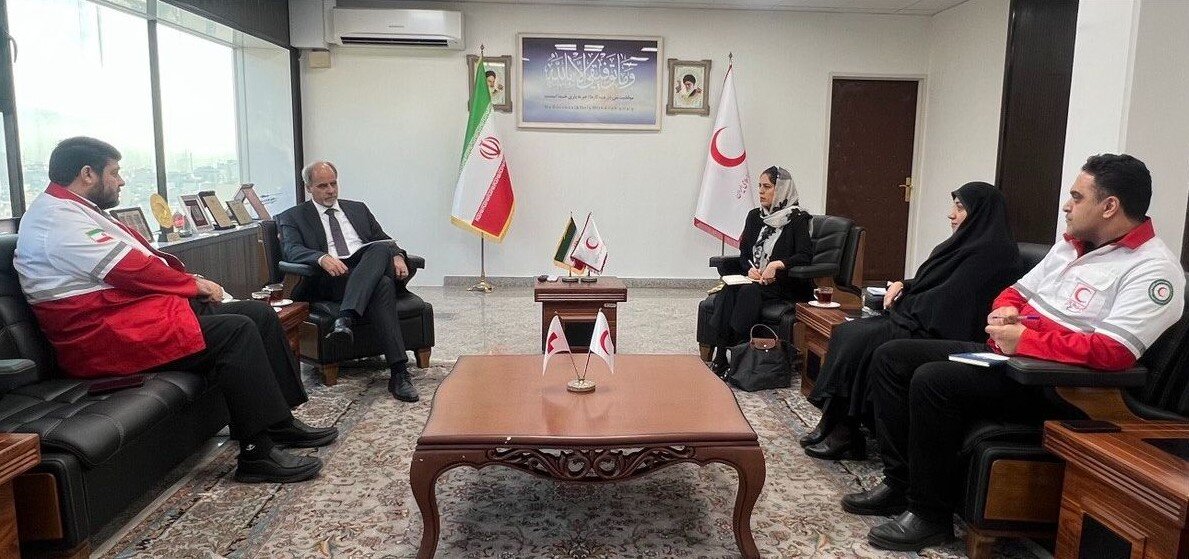IRCS head, UN resident coordinator discuss ways to speed up aid delivery to Lebanon

TEHRAN –The head of the Iranian Red Crescent Society (IRCS), Pirhossein Kolivand, and the UN Resident Coordinator of Iran, Stefan Priesner, held talks on Wednesday about the tragic situation in Lebanon and ways to speed up aid delivery to people impacted by war.
During the meeting, Kolivand condemned the brutal attacks of the Zionist regime on Gaza and Lebanon, the IRCS website reported.
Referring to Israeli crimes, including targeting civilian areas, killing civilians, and attacking ambulances and rescue forces, hospitals, and health centers, the official warned about the humanitarian crisis unfolding in Lebanon and the possibility of genocide.
He called for the immediate intervention of the United Nations to bring an end to the attacks.
Kolivand also presented a report on the shipment of humanitarian aid by the Iranian Red Crescent Society to Lebanon.
Highlighting the urgent need of the Lebanese for medicine, medical equipment, food and essential items, Kolivand announced the IRCS readiness to dispatch more shipments of humanitarian aid. He also stressed the need for active participation and cooperation of the United Nations in the field.
Priesner, for his part, commended the efforts and humanitarian assistance of the IRCS to the people of Lebanon.
He regretted the unfortunate events in Lebanon, pointing out that more than 600,000 people have become homeless as a result of these attacks.
The official highlighted the need to send cash and non-cash aid to affected Lebanese.
Moreover, he regretted the death of 230 staff members of the UN agency in Gaza and two staff members of the United Nations High Commissioner for Refugees (UNHCR) in Lebanon.
The official underscored the importance of ensuring the safety of aid workers in these areas.
IRCS, ICRC, IFRC to help Lebanese people
Kolivand in a meeting on Monday with Faisal Mahboob, the project manager of the International Federation of Red Cross and Red Crescent Societies (IFRC), and Vincent Cassard, the representative of the International Committee of the Red Cross (ICRC) in Iran, underscored the need for ceasefire in Lebanon and opening a safe way to help the war victims.
Since September 23, the Israeli army has been launching an unprecedented, intensive air attack on Lebanon.
Referring to the conducted meetings with the officials of the Lebanese Red Cross and the Syrian Arab Red Crescent, the official said, “Our efforts are directed towards supporting the people affected by war in Gaza and Lebanon,” the IRCS website reported.
Clearly, residential areas in Lebanon are being targeted by Israel while delivering aid is not allowed, he noted.
They practically do not let medical centers operate; the Zionist regime has targeted 11 paramedics in the past 72 hours, as well as the ambulances and rescue teams of the Lebanese Red Cross which has caused challenging situations.
Many are trapped under rubbles while Israel has restricted search and rescue, displaced Lebanese are forced to go to Syria, but they are targeted in the border areas, Kolivand added.
ICRC and IFRC must condemn these attacks, take practical actions, and stand against Israel hindering rescue efforts.
Lebanese people are subject to genocide, blockade, and hindrance of humanitarian aid, serious action must be taken before Lebanon turns into another Gaza.
Many essential items including food, medicines, and medical tools should be sent to Lebanon and the ICRC should find a way to settle war refugees.
Protecting civilians, preventing violations of international humanitarian law, dispatching humanitarian aid, negotiating to stop the war, communicating with the international community, helping immigrants, opening a safe route for delivering assistance, and transferring those injured to safe places should be put on agenda.
ICRC and IFRC should provide health services and treatment to wounded and displaced individuals, educate them about infectious diseases.
They should also provide mental and psychological support to conflict-affected individuals to increase resilience, and create coordination between the members of the IFRC and the IRCS present in the region.
Cassard, for his part, lauded the IRCS timely presence in Lebanon as well as its efforts saying that the society has provided a lot of help to Lebanese so far.
ICRC has long been in Lebanon making its best effort to provide help in emergencies and humanitarian crisis, said Cassard.
Negotiations to resolve conflicts are on the agenda and we are trying to alleviate the suffering of the conflict-affected Lebanese, he added.
During the meeting, Mehboob also commended the IRCS services and assistance provided to the people of Lebanon.
The official said the Federation issued an international call last year to receive more contributions.
The collected money during the period amounted 200 million Swiss francs, which is allocated to Lebanon, Syria and Gaza.
Currently, red alert has been issued in Lebanon and providing humanitarian assistance to Lebanon is on the agenda.
Mahboob pointed out that the situation in Lebanon is dire and all facilities have been mobilized to help the people of the country.
IFRCS and IRCS will enhance cooperation to increase assistance to the Lebanese war victims. However, it requires an international effort and an immediate ceasefire is essential.
MT/MG
